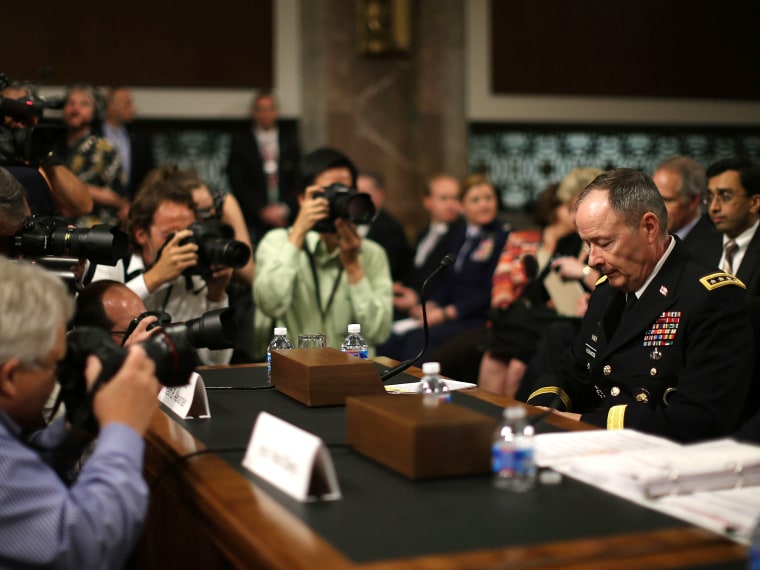The National Security Agency is cracking open the once impenetrable door on its secret operations, allowing the public a glimpse inside after a series of leaks revealed the breadth of its domestic spying operation.
Army Gen. Keith Alexander, director of the NSA, said the agency will release more information in the next week about terrorist plots foiled by the surveillance programs that were recently made public. The disclosures renewed the debate on how the country can balance the demands of privacy and of security post-9/11.
Alexander said Thursday that the government does “owe the American people” some statistics.
He did not reveal what type of data they would declassify and release, but warned of the danger of “causing a terrorist attack by giving out too much information.”
Since Edward Snowden handed over reams of documents detailing U.S. surveillance operations to several reporters, the NSA has released some details on two potential attacks stopped by the programs, and has also briefed members of Congress.
That post-leak offer of additional information from one of the government's most secretive organizations seems to signal a White House effort to shore up the public's confidence and trust.
Related: Activists push uphill to curtail NSA surveillance
The Obama administration has defended the pair of surveillance programs that were revealed this week by the Guardian and Washington Post via Snowden, insisting they’re crucial to national security, are lawful, and even protect civil liberties.
Meanwhile, the phone record grabbing and data mining programs have provoked both fear and outrage—from liberal advocates and conservative libertarians alike--over the government’s seemingly aggressive snooping. The American Civil Liberties Union filed a lawsuit this week challenging the constitutionality of the programs.
Does government know best? Depends who you ask
Setting aside the question of legality for a moment: Do these snooping programs make us more safe? And do the leaks surrounding them somehow make us less safe?
Depends who you ask.
Republican strategist Karl Rove said Snowden made the world a “less safe” place this week. House Speaker John Boehner called Snowden a “traitor” and said his disclosure puts “Americans at risk.” Democratic Sen. Dianne Feinstein said the NSA's behavior is “called protecting America.”
Others, including Daniel Ellsberg, who leaked the Pentagon Papers in 1971, are heralding Snowden as a hero, saying his leaks were critical for democracy. Libertarian Republican Sen. Rand Paul called the NSA program an “astounding assault on the Constitution.”
But those without access to a classified congressional briefing are left to puzzle together disparate shards of selectively declassified information.
We don’t really know how extensive the record keeping is, how abuses of having such information are prevented, and what the rate of terrorism-prevention is. It’s hard to assess the value of the NSA's tactics when you don't even know exactly what the NSA is doing. We can’t say what level of freedom and civil liberties we’re willing to sacrifice for the promise of increased security if we don’t know what level of freedom and civil liberties we're already sacrificing--or how much it's truly affected security. As Donald Rumsfeld might say, there are known unknowns and unknown unknowns.
Trust us
“Trust me,” is what we're left with--the tactic deployed by the NSA director at the beginning of the week. During testimony in front of the Senate Appropriations Committee, Alexander insisted the NSA operates “under strict guidelines and accountability.”
“Everything depends on trust," he added. "We operate in a way that ensures we keep the trust of the American people because that trust is a sacred requirement.” He insisted the government’s phone surveillance program has helped prevent “dozens” of potential terrorist attacks.
Related: What's next for NSA leaker Edward Snowden
When it comes to phone surveillance, a slight majority of Americans believe the trade-off is worth it. According to a new survey by Pew Research Center and The Washington Post, 56% believe it’s “acceptable” for the NSA to track their call records in terrorism investigations. Meanwhile, 41% of Americans said the action is unacceptable.
E-mails are a different story. Of those surveyed, 45% said it’s acceptable for the government to monitor emails to prevent terrorist attacks, with 52% saying the NSA should not be allowed.
But politics matter. In 2006, when George W. Bush was president and employing government surveillance, the majority of Republicans—75%--approved of the surveillance. That number has dipped to 52% today with Obama in office. Similarly, in 2006, just 37% of Democrats found the surveillance acceptable while today 64% are OK with it.
Amy Webb, the CEO of digital strategy consulting firm Webbmedia Group, said it really shouldn’t come as a surprise that the government is mining our personal data, with so much of our personal lives entrenched in technology.
“You don’t stop to think when you send an email or when you send a text message," she said. "We sort of take for granted all of this technology just works, we relax what we’d normally do in terms of privacy.”
In turn, the speed of technology has outpaced our understanding of how privacy is affected. It’s also outpaced what Congress is able to legislate.
“I do think that there’s a new reality,” said Webb. “We have different types of tools to communicate messages and extremely dangerous groups all over the world…the reality is that if we want to be secure, there has to be some monitoring that happens.”
This is the problem. There is clearly a new reality. But we don't know exactly what it is--and so we still don't know what we've given up to get here.
Related stories:
